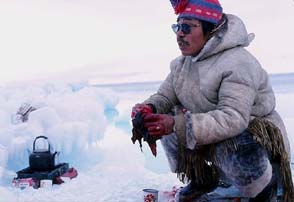Table of Contents
*
Featured Inuit Dog Owners: Jill and Daniel Pinkwater
*
Never Let Go: A Pedestrian Experience
*
Points of View: John Senter; Kathy Schmidt
*
When a Fight Isn't a Fight
*
Arctic Brucellosis Update
*
High Arctic Mushing: Part 1
*
Book Review: Uncle Boris in the Yukon
*
Page from a Behaviour Notebook: Do Dogs Have Emotions?
*
IMHO: Dog Sled Racing vs. Sled Dog Racing
Navigating This
Site
Index of articles by subject
Index
of back issues by volume number
Search The
Fan Hitch
Articles
to download and print
Ordering
Ken MacRury's Thesis
Our
comprehensive list of resources
Talk
to The Fan
Hitch
The Fan Hitch
home page
ISDI
home page
Editor: Sue Hamilton
Webmaster: Mark Hamilton
Contents of The Fan Hitch Website and its publications are protected by international copyright laws. No photo, drawing or text may be reproduced in any form without written consent. Webmasters please note: written consent is necessary before linking this site to yours! Please forward requests to Sue Hamilton, 55 Town Line Rd., Harwinton, Connecticut 06791, USA or mail@thefanhitch.org

Corel photo
More on Arctic Brucellosis
reported by Sue Hamilton
This article is a follow up to one that appeared in the last issue of the Fan Hitch (Vol. 3, No. 4, August 2001). Brucellosis is a bacterial disease that can infect many species, including humans, dogs, arctic marine mammals and caribou.
In response to my inquiry regarding the possible impact of Brucellosis on Arctic sled dogs, I received the following information from Dr. Lena Measures, Fisheries and Oceans Canada, Marine mammals-health, Institut, Maurice Lamontagne Institute, Mont-Joli, Quebec, Canada.
"Brucellosis is a disease caused by bacteria belonging to the genus Brucella. One species, Brucella canis, infects dogs as its principal host but generally causes few clinical signs or disease in dogs. There are a number of other species, with principal hosts being domestic herbivores (cattle, swine, goats, sheep) and wild herbivores (desert wood rat). These species can spill over into a wide variety of animals including domestic or wild herbivores (bison, elk, moose, muskox, reindeer, caribou, rodents, rabbits and hares, etc.), wild and domestic carnivores and humans. Depending on the host and species of Brucella, disease in animals can be non-existent, mild or serious with some infections causing abortions, reproductive problems, arthritis, abscesses, etc. In humans an intermittent fever occurs with weakness, fatigue, general malaise, joint pain, and neurological effects (irritation, nervousness and depression), but not all species of Brucella are pathogenic to humans.
In the Canadian north, barren-ground caribou and reindeer are infected with Brucella suis biovar-4 which can spill over into carnivores such as wolves, dogs and bears. Inuit have been found seropositive to this species and strain of Brucella (which means they have been exposed and have antibodies in their blood). Some clinical cases in Inuit have been reported. Recently, new species of Brucella have been found in the marine environment, infecting cetaceans (whales, dolphins and porpoises) and pinnipeds (seals, sea lions and walrus). These new species have not been completely described, characterized, nor their pathogenicity (disease-causing ability) determined in these hosts nor their potential pathogenicity in spill-over hosts. Some researchers proposed the name Brucella pinnipediae for the Brucella in pinnipeds and Brucella cetaceae for the Brucella in cetaceans. A human was documented as being infected by a marine Brucella while handling infected marine mammal tissues. A mild flu-like illness resulted and was treated with success. Some species of Brucella cause little disease, even in their principal host. Other species of Brucella can be serious pathogens in their principal host and in some spill-over hosts. For example, B. suis biovar-4 (caribou are the principal host) is more pathogenic and invasive in humans than B. abortus (cattle are the principal host).
I would suspect that northern sled-dogs, including the Canadian Inuit dog, have already been exposed to B. suis biovar-4 and the marine Brucella. These bacteria have probably been present in wildlife for some time and likely are not a problem for carnivores."
Dr. Measures did give me the name of someone to contact
for more information.
If and when I receive a response and if there is any
additional information
to report, you'll read it in the next Fan Hitch.